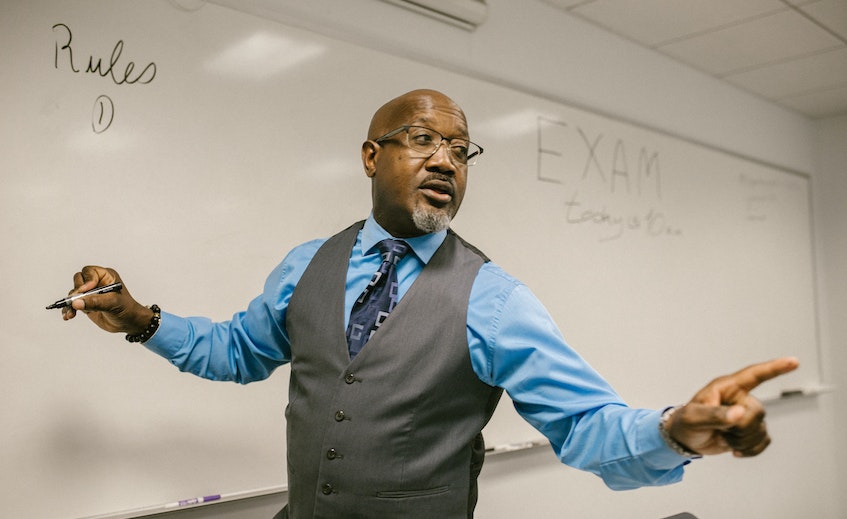
Equality in Academia
July 2, 2019
Why do we all use the same methods in Work and Organizational Psychology?
September 8, 2019The future of critical perspectives in WOP research: Update from the FOWOP day 2019
by Sandiso Bazana
PhD student and Research/Teaching Assistant, Grenoble Ecole de Management France, People, Organizations and Society department.
Lecturer at Rhodes University, South Africa, Psychology Department
In 2011, The Atlantic published an Op-ed written by James McWilliams, an associate professor of history at Texas State University, San Marcos, entitled; the Dangerous psychology of factory farming. James provokes people like myself; meat-eaters, to look into our mindset to examine our participation in the value chain of animal husbandry. James does this by analyzing the mindset of a man he calls; Bill, a factory farmer who runs a big farm in Texas, USA, raising more than 4000 cattle that will later be slaughtered and supplied to the meat industry for consumption by the meat-eaters. James basically wants us to fill guilty for participating in the processing of the meat that ends up on our dinner colorful-dishes. James asks in this article what enable farmers to raise and kill thousands of animals and still consider themselves happy. James writes;
“After 1850, things changed. American agriculture fell into the grip of scientific farming. Agricultural scientists, followed by farmers, began to conceptualize farming as a strictly quantifiable venture. Beginning with plants, and then moving to animals, they became less concerned with individual idiosyncrasies and more concerned with collective evaluations of productivity. The chain of production expanded, and, as it did, farmers came to speak in terms of nutrient input, breeding schedules, confinement space, and disease management. By the 1870s, farmers were regularly referring to their animals not as animals but, literally, as machines being built in factories. "The pig," explained one agricultural manual, "is one of the most valuable machines on the farm. The psychological salve of this rhetoric offered relief to farmers burdened with the task of mass slaughter. "
What James is describing above can be associated with the discipline and practice of Industrial/Organisational Psychology (IOP). IOP is loosely defined as an application of psychological principles and theories to the world of work. IOP is if we go by James terminology; the psychological salve. To salve is to smooth, to appease, or to ease. The dictionary defines salv(ing) as a process of soothing one’s conscience to help them feel less guilty. A brief outline of Munsterberg’s assertions and South Africa’s Health Professions Council’s conceptualization of the role of IOP is worth citing to make the point.
Munsterberg, a German-American Psychologist saw I/OP as an approach to make psychology appeal to the scientific world. The practice of IOP formed part of the new branch of psychology into an applied science. Hugo proclaimed in his book, three so-called “chief principles” of the application of psychology into the workplace. These are; to help find the men (sic) whose mental qualities make them best fitted for the work which they have to (may include Recruitment and Selection)-hence psychometrics or and psychological assessment’ influence in the discipline till date. Secondly; Munsteberg argues, IOP explores the psychological conditions that can be secured to achieve the greatest and most satisfactory output of work from every man (sic) (this would include Person-Environment fit perspectives, including staffing, motivation, etc). Third, IOP must help explain to managers “how to secure the best possible effects from workers (e.g. job satisfaction, Enrichment, training, and development, etc) (p.22). The discipline and its practice have continued in this tradition of investigating and contributing to the understanding, describing, and explaining human behavior in the workplace and in marketing, even beyond the regions where the discipline first emerged (namely; USA).
The Health Professions Council of South Africa (HPCSA); which is the coordinating body for all registered industrial psychologists (including other categories of psychologists and doctors etc) in South Africa, maintains that; industrial psychologists practise in business or industrial settings with the general aim of directly benefiting the economic well-being of the organisation. Industrial Psychologists are concerned with making people function effectively in relation to their working environments.(HPCSA, n.d. cited also in Coetzee and Schreuder, 2010). Both Munsterberg and the HPCSA guide illustrate that I/OP has a major impact on millions of workers and thousands of industries and organisations.
It is upon the foregoing view that I begin my critique of the subject (I/OP—and Organisational Effectiveness). I engage with an approach that, instead of exploring how to make organizations succeed through a mesmerize of the psychological impact of engaging in ‘the immoral’ act of killing animals, or as James writes above; “taking the life of a sentient being with wants and needs” in the name of making organisations effective—I begin with ‘the moral’. I take seriously the role of IOP in business education amid the ongoing debates of decolonization/transformation of the content of what we teach.
Since IOP is directly linked to business education, a critique of its apolitical and assumed ‘neutrality’ has not been questioned much. Few have questioned the discipline and the relevance of its practice in SA, with some postulating a need for the discipline to adopt a more critical approach to the study of work and organisations. I have written elsewhere that, guided by Paulo Frere’s work, to educate means 'to lead out of'. In other words, teachers in IOP must take seriously what it means to "lead" our students and our-minds "out of" the violence of business education.
To teach the subject I draw from critical theory. The treatise by Islam and Zyphur (cited above 2006, 2008) including (Gerard, 2017, Kazi & Indermun, 2014) focus particularly on the role of IOP education in business education. They have all referred to the role that critical theory could play in ‘emancipating’ the discipline and its practice from its mechanistic preoccupations. Islam and Zyphur (2006) view Critical theory as an attempt to uncover the ideological underpinnings of everyday actions, beliefs, and interpersonal relations” (110). IOP should for Islam and Zyphur be a “natural home for Critical theory”—since it (IOP) studies human behaviour within organisational systems, influenced by socioeconomic context, which ‘frames and conditions human beings lives…and forms the circumstances that enslave them” (page, 2008; pg. 110-111). Meaning, if we return to James main thesis, critical theory is the approach that is needed to allow a teacher in IOP to explain the behaviour of Bill, the farm owner, and his workers. Critical pedagogy is influenced by critical theory traditions.
Critical pedagogy is seen as a progressive teaching philosophy that challenges students to examine power structures and patterns of inequality within the discipline. It allows the teacher and students to explore a sociological conflict perspective in examining power structures in society, and in the case of IOPS; within textbooks and research article publications, practice and organisations. This pedagogy is aimed at “liberating” (as Islam & Zyphur, 2006, 2008) assert. It liberates both the teacher and the students, and engages in what education is about as cited above; to lead out of any forms of bondage.
It is this critical pedagogy to teaching that I employ in my teaching practice. I study how organizations operate; how in their operations, power is distributed or restricted. How much power affects human relations, and how in all this, the socio-political and economic context continues to shape the operations of that power—including the very existence of such organizations. I explore how, what others have called moral violence or psychic deadness is maintained by the discipline of industrial/Organisational Psychology, through making sense of the actual job/work performed by the worker. I explore how power affects human relations, and how in all that, socio-political and economic contexts continue to shape the operations of that power—and the very existence of such organisations. In other words; I teach the “chief Principles” (as espoused in Hugo Munsterberg above) with a critical appeal—seeking to build the next generation of workers, managers, and CEOs whom, while prioritizing invention and progress, as ‘modern’ society so desires and demands, continue to explore more humane approaches to IOP— (and Organisational Effectiveness).
In my mind, teaching Industrial/Organisational Psychology (especially courses such as Organisation effectiveness) though may allow for critical engagement and critique, maintains the key principles of the discipline, rather blindly and often concerned with management imperatives as shown in James article. Basically, teaching the subject in its traditional form means teaching it as a ‘psychological salve’. We need (as teachers) to think, critically about what we teach and how we teach this subject. Below is some elaboration on my teaching practice. As teachers of IOP, when we teach with some kind of 'blind loyalty' to the traditional lens of the discipline as suggested in Hugo Munsterberg, we are in fact complicit in the building of a generation of workers who will normalize the pain or the wound of the affected workers, as James writes above--we become complicit in salv(ing) the 'wounds' of these workers.
In conclusion, I/OP remains an important discipline and practice—that, if rethought, in other words, if it considers first that; organisations are not natural entities but socially constructed, therefore, experienced differently by different workers. Secondly, if IOP takes seriously the aim of James’ article above; “to look at our mindset to examine our participation in animal husbandry” (paraphrased).; aren’t we the ones responsible for the psychological salve? We, those teaching in the area must ask ourselves the same ethical questions that James refers to in his article; whether we are not participating in the numbing of the pain and the guilt—this is not limited to James’ concerns with workers who are engaged in the butchering of animals. We must ask ourselves, how can we teach this subject ‘better’—and that requires a serious and more personal engagement with the text that we read in IOP—we need to 'force' our students to create a future that is at least conscious of the position of being psychological salves that our discipline and practice make of us. This is my position of critical teaching in I/OP. As a teacher, I believe, we cannot be neutral[1]. We must teach with conviction in order for our teaching and what we teach to have meaning, beyond the prescriptions of the traditions of the academic disciplines that the postcolonial academy has inherited from the colonial (and apartheid), South Africa-as Professor Shaun Ruggunan of the University of Kwazulu-Natal explicates here.
References
Gerard, N. (2016). Toward a critical I-O psychology. The Industrial-Organizational Psychologist, 54(2). Retrieved from http://www.siop.org/tip/oct16/gerard.aspx
Islam, G., & Zyphur, M. J. (2006). Critical industrial psychology: What is it and where is it. Psychology in Society, 34, 17-30.
Hooks, Bell. (1994) Teaching to transgress: education as the practice of freedom. New York: Routledge.
Islam, G., &Zyphur, M. (2009). Concepts and directions in critical industrial/organizational psychology. In D. Fox, I. Prilleltensky, & S. Austin (Eds.), Critical psychology:An introduction (2nd ed., pp. 110–125). Thousand Oaks, CA: Sage.
Kazi, T. B. & Indermun, V. (2014). Critique and Critical Theory in Industrial Psychology - What is it? Where is it? Arabian Journal of Business and Management Review (Nigerian Chapter), 2(4), 88-94.
Ruggunan, S. (2016). Decolonising management studies: A love story. ActaCommercii, 16(2), 103–138. Google Scholar
Munsterberg, H. (1913). Psychology and industrial efficiency (Vol. 49). A&C Black
Schreuder, D., & Coetzee, M. (2010). An overview of industrial and organisational psychology research in South Africa: A preliminary study. South African Journal of Industrial Psychology, 36(1), 1–11.
Sandiso Bazana is a PhD researcher/ Research and Teaching Assistant in People, Organizations and Society at Grenoble Ecole de Management, France. Email: sandiso.bazana@grenoble-em.com




